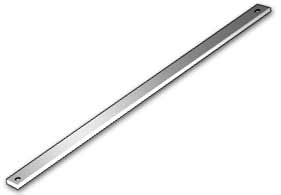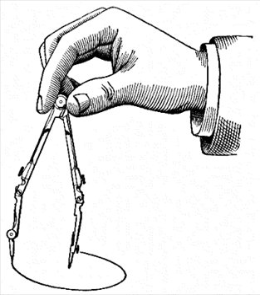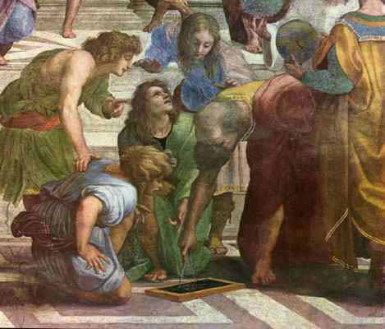
Introduction
Straightedge
[color=#0000ff][b]Straightedge[/b] [/color] can be regarded as a ruler without any marking.[br][br]The following are exactly what a straightedge can do:[br][list][br][*] Draw a unique straight line through two distinct points[br][*] Extend a line segment arbitrarily far in both direction[br][/list][br]Notice that it [b]cannot[/b] be used for measuring length.

Compass
[color=#0000ff][b]Compass[/b][/color] is a V-shaped drawing tool with a sharp point on one arm and a pencil on another arm. The two arms are joined by a hinge so that the openings of the arms is adjustible.[br][br]Obviously, a compass is mainly used for constructing a circle centered at any given point with any given radius.[br][br]There are two types of compasses:[br][list][br][*] [b]Modern compass[/b] - We can keep the opening fixed when the compass leaves the plane and carry to another location for construction.[br][*] [b]Euclidean (or collapsible) compass[/b] - The compass "forgets" the width of the opening when the compass leaves the plane i.e. we cannot keep the opening fixed.[br][/list]

Euclidean Constructions
[color=#0000ff][b]Euclid of Alexandria[/b][/color] (around 300 BC) was a Greek mathematician, who wrote the monumental 13-volume treatise on geometry called "[b]The Elements (幾何原本)[/b]". It laid the foundation of geometry and has been widely considered as the most influential textbook ever written.[br][br]All geometric constructions in "The Elements" only involves straightedge and Euclidean compass. Therefore, such constructions are usually called [b][color=#0000ff]Euclidean constructions[/color][/b].[br][br]There are quite a number of important propositions in "The Elements" which are actually Euclidean constructions. Let us list a few of them here:[br][br][list][*][u]Proposition 1 in Book [/u]I - Construct an equilateral triangle having a given segment as one side.[br][/*][*][u]Proposition 9 in Book I[/u] - Construct the angle bisector of a given angle.[/*][*][u]Proposition 1 in Book III[/u] - Given three non-collinear points, construct the center of the circle containing the three points.[br][/*][*][u]Proposition 11 in Book IV[/u] - Inscribe a regular pentagon (5-sided polygon) in a given circle.[br][/*][/list] [br][br]In this chapter, you will be guided to do various constructions using straightedge and compass. For simplicity, you are allowed to use modern compass instead of the more restrictive Euclidean compass.[br][br]A natural question to think about: Is a modern compass really more powerful than a Euclidean compass? In other words, does there exist something that can be constructed by straightedge and modern compass but not by straightedge and Euclidean compass? We will answer this question later in this chapter.
